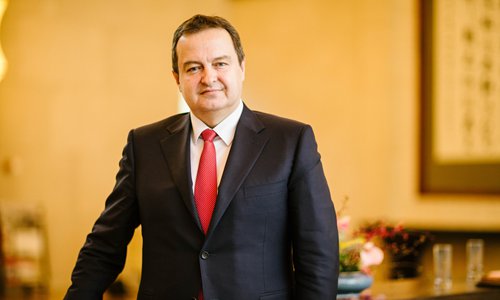



| Wednesday, 14 December 2016. | |
| Serbian First Deputy Prime Minister Ivica Dačić talks China | |
| + larger fontnormal font- Smaller font |
 The Serbian First Deputy Prime Minister and Minister of Foreign Affairs Ivica Dačić (Dačić) visited China from December 14 to 18. It was his first visit to China since he was posted as the Minister of Foreign Affairs in 2014. The Serbian First Deputy Prime Minister and Minister of Foreign Affairs Ivica Dačić (Dačić) visited China from December 14 to 18. It was his first visit to China since he was posted as the Minister of Foreign Affairs in 2014.Dačić and China's Foreign Minister Wang Yi signed a bilateral visa-exemption agreement during the 5th Summit of China and Central and Eastern European (CEE) countries in Riga, Latvia in November, which will be valid at the beginning of 2017. It is a big step forward for people-to-people connections. Dačić emphasized that the two countries should find ways to create conditions for closer cooperation in the economic circles, art groups and universities in the two countries. These efforts are being planned in the cooperation between the CEE countries and China, dubbed the "16+1 cooperation." During his visit, Dačić shared his thoughts on bilateral ties and the latest issues concerning China with the Global Times (GT). GT: What are the sectors that Serbia expects to push forward in bilateral relations with China? Dačić: We found our relations are the best ever in modern history. We have elevated our relationship to the level of comprehensive strategic partnership, which comprises close cooperation in all fields. In addition, I would like to emphasize mutual support sovereignty and territory integrity as vital interest of our two countries. Concerning the economy, we have very profound cooperation, which includes a series of ongoing infrastructure projects and those that are being planned to provide conditions for increase of economic growth in Serbia. GT: What is the biggest gap to be narrowed between the two countries? Dačić: I found that the immediate gap is the geographical gap - two countries that are far away from each other geographically. We should narrow it by means of connectivity. I suggested we open direct flights. We also signed an agreement of visa-exemption between the two countries. This is a very important step forward, especially in the sectors of people-to-people exchange, student exchange and tourism. GT: How do you see China's market economy status, which has not been recognized by the World Trade Organization (WTO)? Dačić: China has its own model of development that proves to be very successful. On the other hand, Serbia has some issues related to WTO, but I think that we should work together to overcome these obstacles. Today, the global economy is very open. Therefore, I think we should move forward in this sense, especially to settle the market and to boost production. GT: What role will Serbia play in the relationship between China and the EU if Serbia becomes an EU member in 2020? Dačić: Serbia is a candidate country of the EU and the EU is a big partner of China. Therefore, I think in the future this can only contribute to Sino-Serbian relations. Serbia is one of the biggest friends to China in Europe. We have a very close relationship and maintain friendship with China. Some of the European countries have a double standard. When they find it suitable, they cooperate with China, but in some circumstances, they criticize China. When we hear negative statements towards China, we find it very unsuitable to the relations between EU and China. GT: What is your favorite Chinese book and what Serbian author would you recommend to the Chinese people? Dačić: Laozi's Tao Te Ching has caught my attention, and I have found that his wisdom could be used in everyday life. Regarding a Serbian author, I would whole-heartedly recommend our Nobel Prize winner Ivo Andrić's book The Bridge on the Drina, which discusses the history of Serbia and its people under rule of Ottoman Empire. Photo: Li Hao/GT |